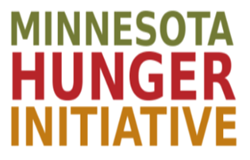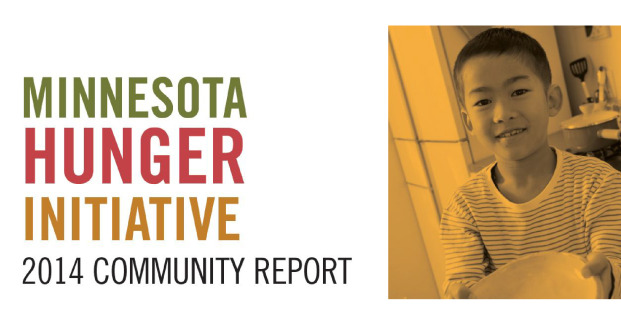2014 Community Report highlights challenges, opportunities to alleviate hunger in Minnesota
The Minnesota Hunger Initiative’s recently completed 2014 Community Report highlights the problems our state faces with hunger, current work toward solutions, and some ways you can help fight hunger. The report draws light to the problems specifically faced by children and older adults in regards to hunger:
- In 2013 Minnesota was one of the top 5 states in the country with the lowest food insecurity rates for children under the age of 18. We are on the right track but want to remain diligent in our efforts to end child hunger. Studies have found that food insecurity has been associated with health problems for children that may hinder their ability to function normally and participate in school.
- When looking at the other end of the spectrum we see that in Minnesota 1 in 12 seniors are at risk of hunger. This is important because in 2040 there will be 79.7 million older adults, more than twice the senior population in 2000. The number of food insecure seniors is projected to increase by 50 percent by 2025.
So what measure are we taking in order to alleviate these concerning issues? In addition the everyday work Minnesota Hunger Initiative partner organizations do to support seniors and children, here are a few innovative programs aimed to help these vulnerable populations:
- Solutran, Medica, and the Minnesota Hunger Initiative partnered together and are offering a Healthy Savings Card. The Card is being offered to low-income food shelf families. The card-holders can redeem $10 worth of fresh produce and healthy food discounts every week.
- The Minnesota Hunger Initiative also partnered with the University of Minnesota to conduct research at 150 food shelves in Minnesota. Findings showed that the nutritional quality of the food improved for food shelves that were informed about the nutritional value of the food from the Healthy Eating Index. Funding is being secured to develop a user-friendly tool for Minnesota food shelves to assess the nutritional value of their entire inventory of food.
- The Minnesota Hunger Initiative is also developing an older adult food kit of promising practices as a resource for Minnesota food shelves to make it easy for older adults to access food.
So what can you do to help? Local food shelves, meal programs, or food banks are always in need of volunteers. If you cannot donate your time you may give cash to a hunger-fighting organization or healthy food items to a food shelf. Visit our partner page to learn more volunteer and donation opportunities.
Click here for the full Minnesota Hunger Initiative 2014 Community Report.

